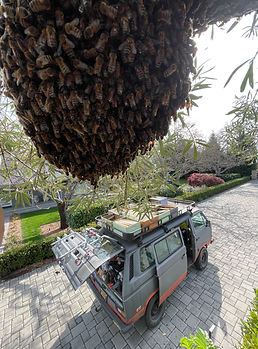


Our Mission:
Supporting Napa's beekeeping community through educational outreach,
treatment-free management, and pollinator habitat advocacy.
Principles in support of our Mission:
-
Natural selection is the means by which bees become better adapted to our local climate, forage, and pathogen risks.
-
Strong genetic fitness can be fostered by beekeepers through propagation of healthy populations adapted to our region’s ecosystem.
-
Protection and expansion of a healthy ecosystem, including the planting of pollinator-friendly plants and avoidance of pesticides/herbicides, are essential for providing pollen, nectar, and habitat for both honey bees and native pollinators.
-
To support colony resilience to stress and disease, chemical treatments are avoided when possible in favor of other less disruptive interventions (e.g., hive manipulations, feeding, artificial brood break, etc.). See NCBA Best Management practices for additional recommendations.

-
Collegial relationships amongst beekeepers, including mentorship, educational forums, and sharing of resources, are key to a healthy and respectful beekeeping community.

The Napa County Beekeepers’ Association is committed to learning and working together to maintain the health and genetic diversity of Apis mellifera and our regional pollinator populations, so crucial for the pollination of plants and overall health of our ecosystems.
Join Us
The Napa County Beekeepers’ Association (NCBA) welcomes beekeepers of all experience levels, as well as those who are simply fascinated by honey bees, native bees and/or all pollinators. We strive to educate the larger Napa Valley community and forge collaborative relationships that support the health of bees and other pollinators, along with the ecosystems they rely upon for their survival and well-being.
We promote treatment- free beekeeping, along with a focus on bee-centric hive management. Through better practices and educational outreach, we aim to provide the best possible conditions and resources, crucial to maintaining a diverse and healthy environment for all.




